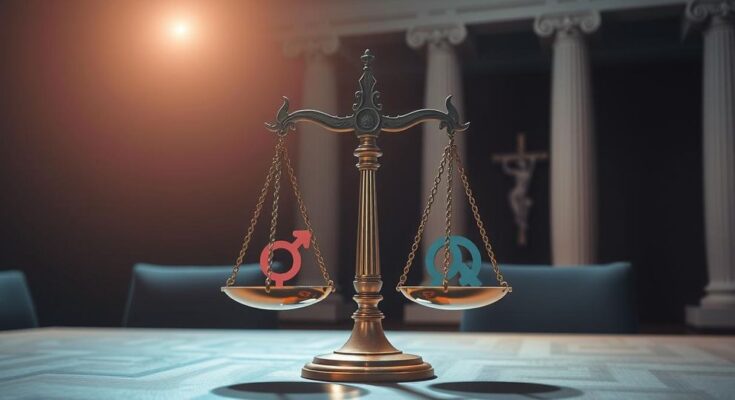The ICC prosecutor is seeking arrest warrants for two senior Taliban leaders, alleging gender persecution against women and girls in Afghanistan. The charges denote a significant advancement in the quest for international justice amid serious breaches of human rights. The investigation, resuming after delays, aims to address systemic abuses and broader violations by the Taliban and ISKP, heightening the call for accountability in Afghanistan.
The International Criminal Court (ICC) prosecutor has applied for arrest warrants against two senior Taliban leaders, Supreme Leader Haibatullah Akhundzada and Chief Justice Abdul Hakim Haqqani, for their alleged roles in persecuting women and girls in Afghanistan. The charges focus on crimes against humanity, including systematic violations of rights against those who do not conform to the Taliban’s gender ideology. This legal pursuit underscores the urgent need for international accountability for human rights abuses in Afghanistan.
The prosecutor’s announcement highlights the Taliban’s oppression of women and girls since their return to power, showcasing their systematic denial of rights including education, freedom of movement, and physical security. The investigation encompasses prior accusations against the regime, extending to acts of violence against individuals perceived as not aligning with Taliban ideologies, particularly among the LGBTQ+ community.
Since the ICC authorized an investigation into Afghanistan in 2020, it has faced pauses due to the former Afghan government’s claims regarding ongoing efforts for justice. However, with emerging evidence and renewed focus on human rights violations, the ICC has resumed its inquiry, spurred by multiple nations expressing grave concern over deteriorating conditions for women and girls under Taliban rule.
Human Rights Watch emphasizes the significance of the ICC’s actions, noting their potential to resurrect global concern about the systemic abuses perpetrated by the Taliban. The prosecutor’s application has not only identified crimes against Afghan women and girls but also seeks to address other severe violations committed by both the Taliban and the Islamic State Khorasan Province (ISKP). These broader findings implicate actions including murders, enforced disappearances, and violent attacks against marginalized communities.
Additionally, the ICC is under scrutiny, facing political pressure from nations like the United States, which threaten sanctions amidst ongoing investigations. Nevertheless, Human Rights Watch advocates for sustained support of the ICC’s independent mandate and urges member countries to facilitate a comprehensive inquiry into abuse in Afghanistan. The organization also calls for the investigation to include alleged crimes by former Afghan government forces and US personnel, highlighting the need for a more rounded approach to accountability.
As the ICC progresses with its investigation, it lays the groundwork for potential future legal actions against those deemed responsible for egregious human rights violations in Afghanistan. The combination of internal and external pressures demands a coordinated response to uphold justice for victims of the Taliban’s oppressive regime, ensuring a comprehensive examination of all alleged abuses since the onset of the conflict.
Ultimately, the ongoing initiatives signal a pivotal moment for Afghan women and girls, bringing renewed hope for recognition and justice for the severe rights violations they have endured. There exists an urgent need for international cooperation and persistent advocacy to break the cycles of impunity that have historically allowed these abuses to continue unchecked.
The ICC prosecutor’s motion for arrest warrants comes amid growing international concern regarding human rights violations against women and girls in Afghanistan under Taliban rule. This legal development represents an important step in addressing the systematic gender-based abuses that have been prevalent since the Taliban regained power in 2021. The situation is further complicated by the geopolitical dynamics surrounding the ICC and its investigations, particularly in relation to pressure from the United States and other nations.
The ICC’s pursuit of justice against Taliban leaders for gender persecution is a crucial step toward accountability for the widespread abuses against women and girls in Afghanistan. Human Rights Watch and other organizations call for global support to ensure a comprehensive investigation that includes all perpetrators of human rights violations in the country. Maintaining international focus on these issues is essential for restoring rights and dignity to the affected populations.
Original Source: www.hrw.org




